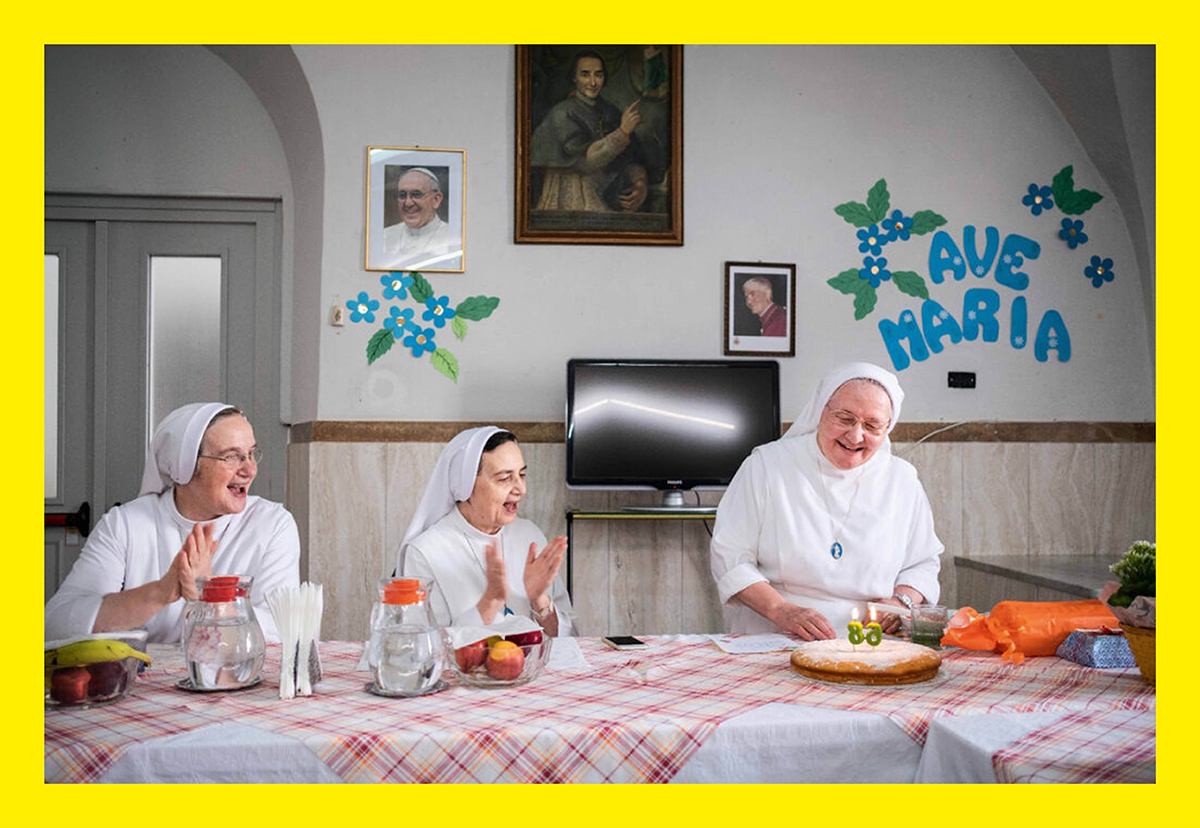Event: Guided tours Whore or Saint — On Being a Woman in Italy
1.6.21: Erik Kessels
10.6.21: Rachele Sordi
16.6.21: Armin Bernhard
22.6.21: Martha Verdorfer
24.6.21: Tessa Moroder

Foto Forum, Bolzano/Bozen (Italy) Whore or Saint – On being Woman in Italy, Guided Tours with Erik Kessels, Rachele Sordi, Armin Bernard, Martha Verdorfer, Tessa Moroder
Exhibition tour #1: Erik Kessels
1.6.21, 6pm
English
Erik Kessels is a Dutch artist, designer and curator with great interest in photography. Kessels is since 1996 Creative Partner of communications agency KesselsKramer in Amsterdam and London.
As an artist and curator Kessels has published over 75 books of his ‘re-appropriated’ images and has written the international bestseller Failed It!
Kessels made and curated exhibitions such as Loving Your Pictures, Mother Nature, 24HRS in Photos, Album Beauty, Unfinished Father and GroupShow.
His mid-career retrospective was shown in Turin, Düsseldorf, Budapest and he exhibited this year in the SFMOMA. He was called “a visual sorcerer” by Time Magazine and a “Modern Anthropologist” by Voque (Italia).
Exhibition tour #2: Rachele Sordi
10.6.21, 6pm
Italian
Rachele Sordi, transfemminista, donna cisgenere, europea, del sud dell’Europa, bianca italiana, educatrice professionale con un posto fisso, modella e ortolana. Di lingua genitoriale italiana, parlo anche tedesco e inglese. Mi sento un pieno sole che ama il verde, le peonie, la magia delle erbe, il vento leggero e la forza della sorellanza.
Exhibition tour #3: Armin Bernhard
16.6.21, 6pm
German
Armin Bernhard, Bildungswissenschaftler, Vertragsprofessor der Freien Universität Bozen und der Hochschule München, Vorstandsmitglied der Sozialgenossenschaft Sophia, diverse Forschungstätigkeiten zum Männlichkeiten, sozialer Innovation u.a.m. Autor von “Männliche Lebenswelten” (Freie Universität Bozen)
Exhibition tour #4: Martha Verdorfer
22.6.21, 6pm
German
Martha Verdorfer, lebt in Bozen, ist Historikerin und Lehrerin und seit seiner Gründung Vorstandsmitglied im Frauenarchiv Bozen.
Arbeitet und publiziert zur Südtiroler Zeitgeschichte, insbesondere zu den Themen Alltags- und Sozialgeschichte, Faschismus und Widerstand, Migration, weibliche Handlungsspielräume und Erinnerungsgeschichte. Seit nunmehr 35 Jahren von der Methode der Oral History fasziniert.
Exhibition tour #5: Tessa Moroder
24.6.21, 6pm
Italian
Tessa Moroder è co-fondatrice insieme a sua sorella Arianna di Lottozero / textile laboratories, centro per l’arte, il design e la cultura tessile, con sede a Prato.
Laureata in economia, statistica e scienze sociali, prima di fondare Lottozero è stata per anni consulente aziendale in vari settori (dall’automotive, al vinicolo, al televisivo) ed è stata CFO di un’impresa di comunicazione culturale, seguita per 4 anni a partire dalla sua fondazione.
Lottozero nasce nel 2016 con lo scopo di incoraggiare lo sviluppo di talenti emergenti, attraverso residenze di produzione creativa e collaborazioni con realtà consolidate del territorio, rivitalizzando così uno dei principali distretti tessili d’Europa. Grazie a Lottozero, alla insider view nel mondo del tessile che esso offre, Tessa si è avvicinata di nuovo alle sue radici di studi economici e ha iniziato ad interessarsi di economia e moda sostenibile.
Exhibition: Whores or saints — On being a woman in Italy
There are few countries in Europe where such deeply entrenched stereotypes of women are as widespread as in Italy. Young women have been lasciviously dancing their way through the evening TV program for the last 65 years. The mother is an icon yet on average a woman is murdered every three days in this land of cavaliers and charmers, most often by her intimate partner.
The two poles of the narrative predominant for centuries now are the whore and the saint, Maria Magdalena and the Blessed Virgin. Photographer Franziska Gilli and reporter Barbara Bachmann went in search of what it means to be a woman in Italy. They published their research findings with @editionraetia in the book Hure oder Heilige — Frau sein in Italien (Whores or saints. On being a woman in Italy), which is the basis of this exhibition.
Gilli and Bachmann counter the stereotypes with images from real life. And they address the causes and the consequences of common images of women: the dominance of the Catholic Church, the era of Fascism, and the influence of popular TV entertainment. Yet another Italy exists, too—one that has been calling out this crass polarization for decades already; an Italy where there recently emerged one of the loudest feminist movements in Europe, Non una di meno (Not One Woman Less).
Special thanks to:
Autonome Provinz Bozen
Stadt Bozen
Stiftung Fondazione Sparkasse
Brigl SpA, Gilli GmbH, Hypo Vorarlberg Leasing AG, E. Innerhofer AG, Niederstätter AG, Rotho Blaas srl, Dr. Sonja Schmidhammer, Schönthaler Bausteinwerk GmbH, Hotel Strasserwirt GmbH, Eisendle GmbH

